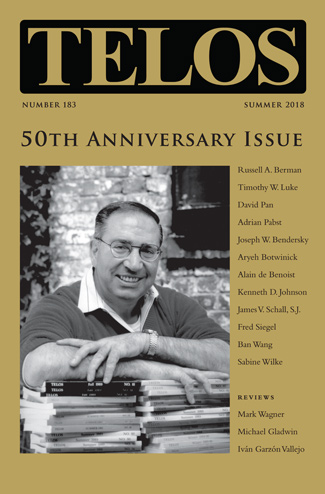Ban Wang’s “Confucianism and Nature: Ecological Motifs in Kang Youwei’s Great Community” appears in Telos 183 (Summer 2018), our fiftieth anniversary issue. Read the full article at the Telos Online website, or purchase a print copy of the issue in our online store. Individual subscriptions to Telos are available in both print and online formats.
 Environmental writers have been turning to Chinese traditions for a harmonious relation between humans and nature. However, treating environmental crises as a metaphysical meditation on how humanity as a whole stands over against nature ignores the critical examination of power relations in the equal relation of production, social hierarchy, and political oppression. As Max Horkheimer and Theodor Adorno declared, humanity’s domination of nature stems from the domination by some humans over others as well as over human nature. Environmental injustice is social injustice. From this immanent critique, Kang Youwei’s recapture of Confucian cosmology proves to be a critical resource. An influential thinker and reformer in the transition from the empire to a modern nation, Kang Youwei (1858–1927) wrote The Great World Community (Datong shu) and proposed to abolish all boundaries of nation-state, class, hierarchy, gender, and race, in hopes of bringing diverse peoples and nations into a cosmopolitan community. Ecological motifs could be recovered in Kang’s critique of oppressive social, political, and gender relations. Upholding Confucian cosmologies not as metaphysics but as critique, he probes into how humanity’s institutions fall short of and violate the ecologically sound relations between Heaven, humans, and Earth. Delving into the widening abyss between value and history, utopian ideals and a human civilization headed for disaster, Kang is acting as a true Confucian critic, wielding a weapon used by Confucius when the sage criticized the corrupt kingdoms by appealing to the past golden age.
Environmental writers have been turning to Chinese traditions for a harmonious relation between humans and nature. However, treating environmental crises as a metaphysical meditation on how humanity as a whole stands over against nature ignores the critical examination of power relations in the equal relation of production, social hierarchy, and political oppression. As Max Horkheimer and Theodor Adorno declared, humanity’s domination of nature stems from the domination by some humans over others as well as over human nature. Environmental injustice is social injustice. From this immanent critique, Kang Youwei’s recapture of Confucian cosmology proves to be a critical resource. An influential thinker and reformer in the transition from the empire to a modern nation, Kang Youwei (1858–1927) wrote The Great World Community (Datong shu) and proposed to abolish all boundaries of nation-state, class, hierarchy, gender, and race, in hopes of bringing diverse peoples and nations into a cosmopolitan community. Ecological motifs could be recovered in Kang’s critique of oppressive social, political, and gender relations. Upholding Confucian cosmologies not as metaphysics but as critique, he probes into how humanity’s institutions fall short of and violate the ecologically sound relations between Heaven, humans, and Earth. Delving into the widening abyss between value and history, utopian ideals and a human civilization headed for disaster, Kang is acting as a true Confucian critic, wielding a weapon used by Confucius when the sage criticized the corrupt kingdoms by appealing to the past golden age.



